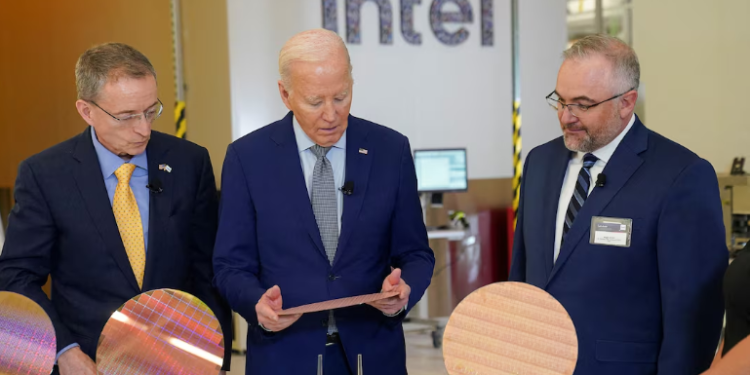[mc4wp_form id=”2320″]
US finalizes $7.86 billion chips manufacturing award for Intel
-
November 27, 2024
- Posted by: Evans Asare

US finalizes $7.86 billion chips manufacturing award for Intel. The U.S. Commerce Department said Tuesday it was finalizing a $7.86 billion government subsidy for Intel (INTC.O), opening a new tab, down from $8.5 billion announced in March after the California-based chips maker won a separate $3 billion award from the Pentagon.
The award will support nearly $90 billion in manufacturing projects in Arizona, New Mexico, Ohio, and Oregon.
“That means American-designed chips being manufactured and packaged by American workers in the United States by an American company for the first time in a very long time,” Commerce Secretary Gina Raimondo said.
Intel has already met some initial project milestones and will receive at least $1 billion of the award before the end of December, a government official told reporters, adding that the grant reduction was not connected to Intel’s broader struggles this year.
Margins have narrowed and the chipmaker has laid off thousands of employees, after years of heavy spending at the once-dominant chipmaker by Chief Executive Pat Gelsinger.
The $7.86 billion subsidy is the largest of any award under a 2022 law that seeks to boost domestic semiconductor output with $52.7 billion in funding, including $39 billion for semiconductor production and $11 billion for research.
Intel in September won a $3 billion contract with the Defense Department, after the initial $8.5 billion in grants had been announced. Funding for the Pentagon contract ended up coming from the $39 billion that U.S. lawmakers allocated for chip manufacturing subsidies rather than the Pentagon’s budget, which led to a reduction in Intel’s direct grant award, the company and the government official said.
Gelsinger said Tuesday “strong bipartisan support for restoring American technology and manufacturing leadership is driving historic investments that are critical to the country’s long-term economic growth and national security.”
Intel opted not to finalize a separate $11 billion low-cost government loan that had been offered in March.
The company said Tuesday the loan terms “were less favorable than anticipated for Intel’s shareholders and did not align with Intel’s long-term growth and market interests.” It said it looks forward to engaging with the incoming administration about utilizing loan provisions in the future.
Intel said it also plans to claim the Treasury Investment Tax Credit, which is expected to be up to 25% of qualified investments of more than $100 billion.
Raimondo noted the Intel award was the sixth to be finalized and that more would be completed in the coming weeks. She added that awards were being finalized “in a way that protects and safeguards taxpayer dollars.”
The Commerce award, therefore, includes restrictions on stock buybacks for five years, along with provisions for the sharing of ‘meaningful’ excess profits.

BWER Company is committed to advancing Iraq’s industrial sector with premium weighbridge systems, tailored designs, and cutting-edge technology to meet the most demanding applications.
buy cialis online free shipping Tadal Access cialis goodrx
https://tadalaccess.com/# tadalafil citrate bodybuilding
cialis walmart: TadalAccess – cialis sample request form
generic cialis: cialis generic purchase – does cialis raise blood pressure